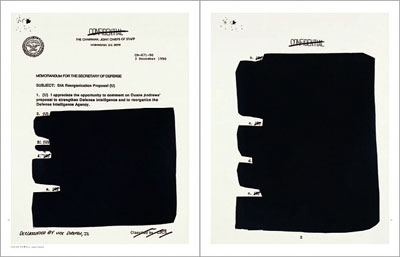
As a compact but cogent set of explorations on governmental secrecy, censorship and other forms of knowledge control, the exhibit "For Reasons of State" consequently doubles as a menagerie of information technologies: projects on display feature microfiche, voice mail, tape recording, 16mm educational film, printed books, photography, surveillance video, card catalogs, typewritten documents, and good old pencil and paper-- though, perhaps significantly, there's not a computer monitor in sight. Ben Rubin's Dark Source (2005) comes closest via perverse analogy: a bank of microfiche readers displaying copies of documents that appear to be nothing but hand-scrawled bars. During a 2002 security snafu, Rubin was able to acquire the software code for Diebold's controversial voting machines, but then blacked out each line--in accordance with corporate trade secret laws-- before exhibiting it. Rubin's self-imposed censorship mirrors Jenny Holzer's Redaction Paintings (2006) mounted nearby, comprised of enlargements of classified US government documents released via the Freedom of Information Act, still containing large swathes of darkness. Other pieces deal less with active suppression of facts than their effective loss through lack of proper indexing: Lin + Lam's Unidentified Vietnam (2003-Present) series recreates a sloppy card catalog from the Library of Congress's collection of hundreds of propaganda films produced with the help of the American government for use in South Vietnam, while Mark Lombardi's Neil Bush, Silverado, MDC, Walters and Good c. 1979-90 (2nd Version) (1996) serves as an example of the late artist's obsessive sketches of conspiracy-style flow charts linking together powerful individuals, government bodies and corporations in tightly-bounded nests of sometimes inscrutable interconnections. The more exhibited and obvious choices for the show's theme (Trevor Paglen's photos of "black sites," Julia Meltzer and David Thorne's oft-programmed video essay "It's not my memory of it": three recollected documents, 2003) gain a new context. "For Reasons of State" argues for a new, unnamed genre of art: one in which numerous and varied artists have attempted to wrest information from the powers that be, not so much to share the data, but to bear witness to the nature of its obfuscation. - Ed Halter
Jenny Holzer, Redaction Paintings, 2006